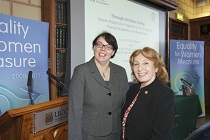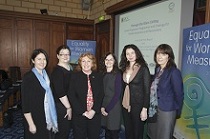- Home
- About Us
- Research
- Research Clusters & Working Groups
- Ageing
- Children and Young People
- Research for Civil Society, Environment and Social Action (REACT)
- Genders, Sexualities and Families
- Disability and Mental Health
- SHAPE
- CARE21
- Migration and Integration
- Poverties, Social Justice and Inequalities
- Gender and the Academy Research Working Group
- Crime and Social Harm (CSH)
- Populism and the Rise of the Far-right
- Work, Organisations and Welfare
- News and Events
- People
- Events
- Join Us
Through the Glass Ceiling
Through the Glass Ceiling
Career Progression Programme and Strategy (CPPS) for Female Academics and Researchers
Project Team: Dr. Caitriona Ni Laoire (PI), Prof. Geraldine Boylan, Dr. Carol Linehan, Dr. Linda Connolly
Project Coordinator: Aifric O'Grada
A collaboration between the ISS21 Family, Gender and Sexualities Cluster and the UCC Equality Committee
Duration: December 2010 to December 2012
Through the Glass Ceiling was a programme of positive action aimed at career progression for female academics and researchers in University College Cork between 2010 and 2012.
The project was funded under the Equality for Women Measure 2010-2013, with funding from the European Social Fund (ESF) through the Human Capital Investment Operational Programme 2007-2013 and the Department of Justice and Equality.
Through the Glass Ceiling Aims
Aims
To develop and deliver tailored mentoring andprofessional development programmes aimed at the empowerment of female academics and researchers in relation to their own career paths and at the promotion of gender equality in career progression
To identify and implement organisational strategies that will tackle gender inequalities and horizontal and vertical segregation as well as gendered organisational cultures
To raise awareness of gender inequality, and the potential of positive action initiatives to address it, within the university and the higher education sector in Ireland
Key principles
The principles underpinning the project were reinforced in every activity and were important elements in the project’s success:
Positive action
Addressing inequality requires a pro-active policy approach aimed at positive change, one which goes beyond basic compliance with anti-discrimination legislation. The project was designed in this spirit as a positive action intervention.
Empowerment in relation to career
Empowering women for their careers was a key concern: it is important that women strategically address their career ambitions, achievements and opportunities whether that is to move upwards, sideways or simply to get more from the position they are currently in. The mentoring and professional development programmes provided the space and the tools for women to do this ona long-term basis.
Structural change
Actions aimed at the empowerment of women in relation to their careers need to be complemented by actions aimed at structural and cultural change if sustainable change is to be achieved.
Women sharing knowledge with other women
The principle of women supporting other women was an important element of the project not only in recognising the importance of shared experiences and empathy but in strengthening the visibility of senior female role models forwomen.
Leadership
Leadership comes in many forms and it is practiced in many ways: at the personal level, informally with colleagues or officially with staff. The project encouraged leadership throughout the project and recognised tha tdifferent models of leadership enrich rather than weaken an organisation and that effective leadership requires awareness of, and respect for, equality and diversity.
Through the Glass Ceiling Mentoring Scheme
A core part of Through the Glass Ceiling was the Female-to-Female Academic Mentoring Scheme. Forty mentoring partnerships and three mentoring circles were established during the lifetime of the project.
Mentoring is an internationally recognised model of career development and has been particularly successful in supporting the career development of female staff in universities and other institutions in which they are significantly under-represented at senior levels.
Mentoring is a goal-oriented relationship that aims to enhance and nurture career development and reflection on the part of the mentee through guidance and support from a more experienced mentor. It is a mutually beneficial learning exchange of perspectives and the informal knowledge gained through experience.
Why mentoring? Participating in a mentoring programme enables female academics to ground their experiences within the broader structural context of the institution and to obtain focused support and encouragement to achieve specific objectives within a wider career development plan. International experience suggests that mentoring can help female staff for a number of particular reasons:
- Women can lack senior role-models in institutions where the majority of senior positions are held by men.
- The responsibilities women often hold both within, and outside of, the university can limit their ability to participate in formal and informal networking activities that can be more available to male staff.
- A professional relationship of support, encouragement and commitment to the career development of the female academic can be an important factor in women achieving their career goals.
- Internationally, schemes for women in universities have reported significant benefits for both the mentee and the mentor.
Through the Glass Ceiling Professional Development Programme
A comprehensive Professional Development Programme aimed at female academics and researchers was developed and delivered as part of the Through the Glass Ceiling project.
Universities are, traditionally, patriarchal institutions; in practice this often means that the types of work, relationships and opportunities most available to women tend to provide less advantage for career progression than those of their male equivalents.
Therefore…
Despite females over-achieving academically through second- and third- level studies, academic women in universities around the world are over-represented in part-time positions and in the lowest levels of the academic career structure and are significantly under-represented at senior management and professorial levels. Combining the best of career development strategies with the knowledge of issues specific to the experiences of being a woman in a university, these training workshops provided key skills and awareness to female academic and research staff tailored to their particular career stage.
The programme aimed to provide female academics and researchers within UCC with:
- Space and support to strategically review and plan their careers and work
- Specific skills to support their wider career and professional development
The Programme involved the following components:
- Strategic Career Review and Planning Programme
- Specific Career Skills Programme, including courses on:
-
Time Management for Extremely Busy Women
-
Professional Networking for Academic Women
-
Promotions and Recruitment: a Q&A Panel
-
Strategic Leadership for Senior Academic Women
-
Aspiring to Leadership for Academic Women
-
?
Policy Recommendations
Through the Glass Ceiling has initiated and coordinated a collaborative action between a range of stakeholders from the Irish higher education sector which has produced a set of Recommendations for Actions Towards Gender Equality in Academic and Research Careers, which were launched in November 2012 by Minister Kathleen Lynch T.D. in University College Cork.
A national network of stakeholders has been formed following the national collaborative process. The purpose of the network will be the promotion of gender equality in research and academic careers throughout Ireland.
Launch of Final Report and Recommendations
On 19th November 2012, the Final Report of the Through the Glass Ceiling project and the National Recommendations for Actions Towards Gender Equality in Academic and Research Careers were launched in UCC by Kathleen Lynch, TD, Minister of State for Disability and Equality. The keynote address was delivered by Dr. Eucharia Meehan, Head of Research Programmes and Capital Investment at the Higher Education Authority and Director of the Irish Research Council.
Through the Glass Ceiling Final Report - October 2012

Project Team at Launch of Final Report
The Through the Glass Ceiling Project Team pictured with Kathleen Lynch TD at the launch of the project final report and recommendations.
Left to right: Linda Connolly, Carol Linehan, Kathleen Lynch TD, Caitriona Ni Laoire, Aifric O Grada, Geraldine Boylan

Through the Glass Ceiling video
This short video captures some of the experiences of Through the Glass Ceiling through the voices of the participants.
